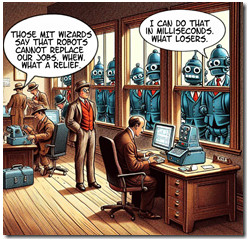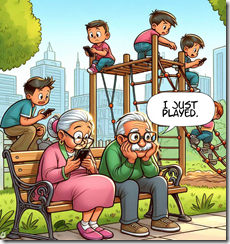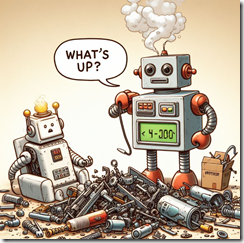It Is Here: The AI Generation
February 2, 2024
 This essay is the work of a dumb dinobaby. No smart software required.
This essay is the work of a dumb dinobaby. No smart software required.
Yes, another digital generation has arrived. The last two or three have been stunning, particularly when compared to my childhood in central Illinois. We played hide and seek; now the youthful create fake Taylor Swift videos. Ah, progress.
I read “Qustodio Releases 5th Annual Report Studying Children’s Digital Habits, Born Connected: The Rise of the AI Generation.” I have zero clue if the data are actual factual. With the recent information about factual creativity at the Harvard medical brain trust, nothing will surprise me. Nevertheless, let me highlight several factoids and then, of course, offer some unwanted Beyond Search comments. Hey, it is a free blog, and I have some friskiness in my dinobaby step.
Memories. Thanks, MSFT Copilot Bing thing. Not even close to what I specified.
The sample involved “400,000 families and schools.” I don’t remember too much about my Statistics 101 course 60 years ago, but the sample size seems — interesting. Here’s what Qustodio found:
YouTube is number one for streaming, kiddies spent 60 percent more time on TikTok
How much time goes to couch potato-ing? Here’s the answer:
TikTok continued to captivate with children spending a global average of 112 minutes daily on the app – up from 107 in 2022. UK kids were particularly fond of the bottomless scroll as they racked up 127 mins/day.
Why read, play outdoors, or fiddle with a chemistry set? Just kick back and check out ASMR, being thin, and dance move videos. Sounds tasty, doesn’t it?
And what is the most popular kiddie app? Here’s the answer:
Snapchat.
If you want to buy the full report, click this link.
Several observations:
- The smart software angle may be in the full report, but the summary skirts the issue, recycling the same grim numbers: More video, less of other activities like being a child
- Will this “generation” of people be able to differentiate reality from fake anything? My hunch is that the belief that these young folks have super tuned baloney radar may be — baloney.
- A sample of 400,000? Yeah.
Net net: I am glad to be an old dinobaby. Really, really happy.
Stephen E Arnold, February 2, 2024
Flailing and Theorizing: The Internet Is Dead. Swipe and Chill
February 2, 2024
 This essay is the work of a dumb dinobaby. No smart software required.
This essay is the work of a dumb dinobaby. No smart software required.
I do not spend much time with 20 somethings, 30 something, 40 somethings, 50 somethings, or any other somethings. I watch data flow into my office, sell a few consulting jobs, and chuckle at the downstream consequences of several cross-generation trends my team and I have noticed. What’s a “cross generational trend”? The phrase means activities and general perceptions which are shared among some youthful college graduates and a harried manager working in a trucking company. There is the mobile phone obsession. The software scheduler which strips time from an individual with faux urgency or machine-generated pings and dings. There is the excitement of sports events, many of which may feature scripting. There is anomie or the sense of being along in a kayak carried to what may be a financial precipice. You get the idea.
Now the shriek of fear is emanating from online sources known as champions of the digital way. In this short essay, I want to highlight one of these; specifically, “The Era of the AI-Generated Internet Is Already Here: And It’s Time to Talk about AI Model Collapse.” I want to zoom the conclusion of the “real” news report and focus on the final section of the article, “The Internet Isn’t Completely Doomed.”
Here we go.
First, I want to point out that communication technologies are not “doomed.” In fact, these methods or techniques don’t go away. A good example are the clay decorations in some homes which way, “We love our Frenchie” or an Etsy plaque like this one:
Just a variation of a clay tablet produced in metal for an old-timey look. The communication technologies abundant today are likely to have similar stickiness. Doom, therefore, is Karen rhetoric in my opinion.
Second, the future is a return to the 1980s when for-fee commercial databases were trusted and expensive sources of electronic information. The “doom” write up predicts that content will retreat behind paywalls. I would like to point out that you are reading an essay in a public blog. I put my short writings online in 2008, using the articles as a convenient archive. When I am asked to give a lecture, I check out my blog posts. I find it a way to “refresh” my memory about past online craziness. My hunch is that these free, ad-free electronic essays will persist. Some will be short and often incomprehensible items on Pinboard.in; others will be weird TikTok videos spun into a written item pumped out via a social media channel on the Clear Web or the Dark Web (which seems to persist, doesn’t it?) When an important scientific discovery becomes known, that information becomes findable. Sure, it might be a year after the first announcement, but those ArXiv.org items pop up and are often findable because people love to talk, post, complain, or convert a non-reproducible event into a job at Harvard or Stanford. That’s not going to change.
A collapsed AI robot vibrated itself to pieces. Its model went off the rails and confused zeros with ones and ones with zeros. Thanks, MSFT Copilot Bing thing. How are those security procedures today?
Third, search engine optimization is going to “change.” In order to get hired or become famous, one must call attention to oneself. Conferences, Zoom webinars, free posts on LinkedIn-type services — none of these will go away or… change. The reason is that unless one is making headlines or creating buzz, one becomes irrelevant. I am a dinobaby and I still get crazy emails about a blockchain report I did years ago. (The somewhat strident outfit does business as IGI with the url igi-global.com. When I open an email from this outfit, I can smell the desperation.) Other outfits are similar, very similar, but they hit the Amazon thing for some pricey cologne to convert the scent of overboardism into something palatable. My take on SEO: It’s advertising, promotion, PT Barnum stuff. It is, like clay tablets, in the long haul.
Finally, what about AI, smart software, machine learning, and the other buzzwords slapped on ho-hum products like a word processor? Meh. These are short cuts for the Cliff’s Notes’ crowd. Intellectual achievement requires more than a subscription to the latest smart software or more imagination than getting Mistral to run on your MacMini. The result of smart software is to widen the gap between people who are genuinely intelligent and knowledge value creators, and those who can use an intellectual automatic teller machine (ATM).
Net net: The Internet is today’s version of online. It evolves, often like gerbils or tribbles which plagued Captain Kirk. The larger impact is the return to a permanent one percent – 99 percent social structure. Believe me, the 99 percent are not going to be happy whether they can post on X.com, read craziness on a Dark Web forum, pay for an online subscription to someone on Substack, or give money to the New York Times. The loss of intellectual horsepower is the consequence of consumerizing online.
This dinobaby was around when online began. My colleagues and I knew that editorial controls, access policies, and copyright were important. Once the ATM-model swept over the online industry, today’s digital world was inevitable. Too bad no one listened when those who were creating online information were ignored and dismissed as Ivory Tower dwellers. “Doom”? No just a dawning of what digital information creates. Have fun. I am old and am unwilling to provide a coloring book and crayons for the digital information future and a model collapse. That’s the least of some folks’s worries. I need a nap.
Stephen E Arnold, February 1, 2024
Answering a Question Posed in an Essay about Search
February 1, 2024
 This essay is the work of a dumb dinobaby. No smart software required.
This essay is the work of a dumb dinobaby. No smart software required.
One of my research team asked me to take a look at an essay located at TomCritchlow.com. “Notes on Search and AI: More Questions Than Answers” reflects the angst generated by generative artificial intelligence. The burr under the saddle of many online users is festering. The plumbing of search is leaking and many of the thumb-typing generation are getting their Airbirds soaked. The discomfort is palpable. One of the people with whom I chat mentioned that some smart software outfits did not return the financial results the MBA whiz kid analysts expected. (Hello, Microsoft?)
The cited essay ends with a question:
Beep boop. What are you thinking about?
Since the author asked, I will answer the question to the best of my ability.
Traditional research skills are irrelevant. Hit the mobile and query, “Pizza near me.” Yep, that works, just not for the small restaurant or “fact”. Thanks, MSFT Copilot Bing thing. How is your email security today? Good enough I bet.
First, most of those who consider themselves good or great online searchers, the emergence of “smart” software makes it easy to find information. The problem is that for good or great online searchers, their ability to locate, verify, analyze, and distill “information” lags behind their own perception of their expertise. In general, the younger online searching expert, the less capable some are. I am basing this on the people with whom I speak in my online and in-person lectures. I am thinking that as these younger people grow older, the old-fashioned research skills will be either unknown, unfamiliar, or impossible. Information cannot be verified nor identified as authoritative. I am thinking that the decisions made based on actionable information is going to accelerate doors popping off aircraft, screwed up hospital patient information systems, and the melancholy of a young cashier when asked to make change by a customer who uses fungible money. Yes, $0.83 from $1.00 is $0.17. Honest.
Second, the jargon in the write up is fascinating. I like words similar to “precision,” “recall,” and “relevance,” among others. The essay explains the future of search with words like these:
Experiences, AI-generated and indexable
Interfaces, adaptive and just-in-time
LLM-powered alerts
Persistence
Predictability
Search quality
Signs
Slime helper
I am thinking that I cannot relate my concept of search and retrieval to the new world the write up references. I want to enter a query into a data base. For that database, I want to know what is in it, when it was updated, and why the editorial policies are for validity, timeliness, coverage, and other dinobaby concepts. In short, I want to do the research work using online when necessary. Other methods are usually required. These include talking to people, reading books, and using a range of reference tools at that endangered institution, the library.
Third, I am thinking that the equipment required for analytic thinking, informed analysis, and judicious decision making is either discarded or consigned to the junk heap.
In short, I am worried because I don’t want indexable experiences, black-box intermediaries, and predictability. I want to gather information and formulate my views based on content I can cite. That’s the answer, and it is not one the author of the essay is seeking. Too bad. Yikes, slime helper.
Stephen E Arnold, February 1, 2024
Robots, Hard and Soft, Moving Slowly. Very Slooowly. Not to Worry, Humanoids
February 1, 2024
 This essay is the work of a dumb dinobaby. No smart software required.
This essay is the work of a dumb dinobaby. No smart software required.
CNN that bastion of “real” journalism published a surprising story: “We May Not Lose Our Jobs to Robots So Quickly, MIT Study Finds.” Wait, isn’t MIT the outfit which had a tie up with the interesting Jeffrey Epstein? Oh, well.

The robots have learned that they can do humanoid jobs quickly and easily. But the robots are stupid, right? Yes, they are, but the managers looking for cost reductions and workforce reductions are not. Thanks, MSFT Copilot Bing thing. How the security of the MSFT email today?
The story presents as actual factual an MIT-linked study which seems to go against the general drift of smart software, smart machines, and smart investors. The story reports:
new research suggests that the economy isn’t ready for machines to put most humans out of work.
The fresh research finds that the impact of AI on the labor market will likely have a much slower adoption than some had previously feared as the AI revolution continues to dominate headlines. This carries hopeful implications for policymakers currently looking at ways to offset the worst of the labor market impacts linked to the recent rise of AI.
The story adds:
One key finding, for example, is that only about 23% of the wages paid to humans right now for jobs that could potentially be done by AI tools would be cost-effective for employers to replace with machines right now. While this could change over time, the overall findings suggest that job disruption from AI will likely unfurl at a gradual pace.
The intriguing facet of the report and the research itself is that it seems to suggest that the present approach to smart stuff is working just fine, thank you very much. Why speed up or slow down? The “unfurling” is a slow process. No need for these professionals to panic as major firms push forward with a range of hard and soft robots:
- Consulting firms. Has MIT checked out Deloitte’s posture toward smart software and soft robots?
- Law firms. Has MIT talked to any of the Top 20 law firms about their use of smart software?
- Academic researchers. Has MIT talked to any of the graduate students or undergraduates about their use of smart software or soft robots to generate bibliographies, summaries of possibly non-reproducible studies, or books mentioning their professor?
- Policeware vendors. Companies like Babel Street and Recorded Future are putting pedal to the metal with regard to smart software.
My hunch is that MIT is not paying attention to the happy robots at Tesla or the bad actors using software robots to poke through the cyber defenses of numerous outfits.
Does CNN ask questions? Not that I noticed. Plus, MIT appears to want good news PR. I would too if I were known to be pals with certain interesting individuals.
Stephen E Arnold, February 1, 2024
AI and SEO: If This Does Not Kill Relevance, Nothing Will
February 1, 2024
 This essay is the work of a dumb dinobaby. No smart software required.
This essay is the work of a dumb dinobaby. No smart software required.
The integration of AI into search engines may help consumers better find what they are looking for and reduce or eliminate creepy intrusive ads. More importantly, for readers of Adweek anyway, that dynamic is an opportunity for advertisers. Now they can more finely target ads while charming potential customers with friendly algorithmic rapport. That is the gist of write-up, “3 Major Ways Generative AI Is Redefining Search.” Under the subheadings “Dialogue over monologue,” “Offers not ads,” and “Subjective data over objective data,” writer Christian J. Ward details how marketers can leverage the human-esque qualities of AI interactions to entice consumers. For example, under the first of these “pivotal shifts,” Ward writes:
“With conversational AI as the interface, consumers can share exactly what they want to share, and brands can focus on great responses instead of suboptimal guesses. … When a consumer freely offers details on what they seek and why, the brand can leverage that zero-party data to personalize their experience. Trust is built through dialogues, not infinite monologues algorithmically ranked in search engine results. Most importantly, these AI-driven dialogues open unprecedented opportunities for brands to engage each person individually.”
Yes, trust is built through dialogues. But is that still the case when one party is a fake person? Probably, for many consumers. Ward goes on to describe ways companies can capitalize on these “conversations:”
“Conversations like these build trust and enable the brand to customize an offer that meets the needs of that individual customer. This is the future of offer-based interactions, directly controlled by a dialogue with the customer. Moving from privacy-invasive ad models to trust-centric dialogue models will take time. But for objective questions—which often directly precede conversion and purchase decisions—brands will utilize gen AI aggressively to take back the consumer dialogue from centralized search systems that seek to monetize ad spend.”
Reduce one’s ad budget while using salary-free AI to build lucrative customer rapport? Sounds great. Unless one’s interest is in truly relevant search results, not marketing ploys. Welcome to the next iteration of SEO.
Cynthia Murrell, February 1, 2024






